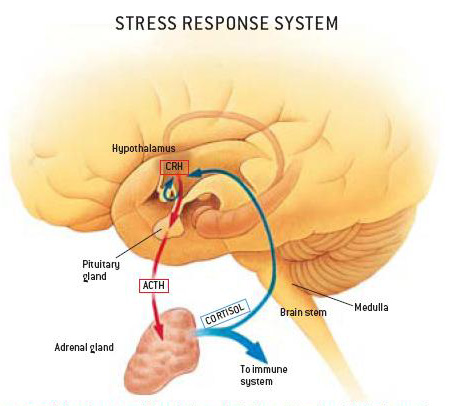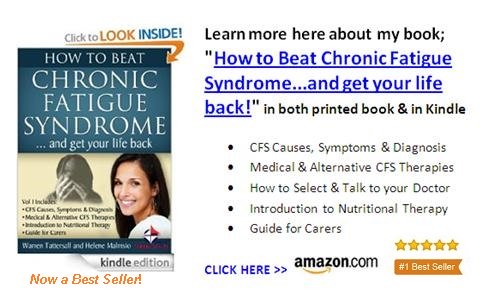| Back to Back Issues Page |
 |
|
The Impact of Stress" - Your Health Success ezine October 01, 2019 |
| Hi there
I hope you enjoy the e-zine as much as I do writing it. Index: Optimum Health Tip: Quote of the Day: Health Report: The Impact of Stress Recommendations & Sponsors Warren’s Notes Have a Laff! Inspirational Meme: Your ebook download "How to Live to 100" Thank you to my readers who refer other people to my ezine. If they want to subscribe for the next edition, they can just visit the website and subscribe here: SUBSCRIBE to eZine If you ever decide that you want to unsubscribe, you will find the link to do so at the bottom of this page. (But we will really miss you!) Optimum Health Tip:Create An Individualized Health PlanMost adults want to lose weight, but everyone’s goals are unique. No matter how little or how much weight you have to lose, creating a plan that will fit into your unique lifestyle is important. • Determine your ideal weight (with the help of a doctor or nutritionist, if necessary) • Write specific ways of how you can get yourself moving everyday • Implement the dietary changes you need to make by removing temptation • Communicate with your family and friends about how they can best support you As you develop your health plan, write everything down in a notebook or an online journal. The practice of taking pen to paper makes the plan more real, as though it’s a contract you’ve made with yourself to become healthier. On especially hectic days, having a written plan to look at quickly will also keep you from making poor food choices. Keep in mind that your plan may change. Nothing is written in stone and as your lifestyle changes, so will your health plan. As you discover new exercise regimens or new foods, add those to your plan. You can also include your favorite healthy recipes and any quotes that you find especially encouraging or inspiring in your notebook. Also, decide on a way to hold yourself accountable for your choices. Group weight loss meetings have this accountability built-in by creating a supportive, friendly environment. Perhaps you can find a trusted friend who will promise to check in with you each week to keep track of your progress. Or better yet, get this friend to exercise with you during the week so you can stay motivated and discuss any potential problems coming up. ** Quick Tip: Fight negative, self-defeating thoughts by exercising. Don’t think about it, just walk around the block or up and down your stairs until you regain your composure.
Motivating Quotes:"I'm not afraid of death, I just don't want to be around when it happens." - Woody Allen" "A dream is just a dream. A goal is a dream with a plan and a deadline." "Twenty years from now you will be more disappointed by the things that you didn't do than by the ones you did do. So throw off the bowlines. Sail away from the safe harbor. Catch the trade winds in your sails. Explore. Dream. Discover." "Fun is about as good a habit as there is." REPORT: "The Impact of Stress on Your Body"
We all experience stress from time to time and occasional stress isn't a problem - in fact, it can be helpful. But when you experience chronic stress as many people do, your body can begin to break down. The worst part of this process is that most people just go with the flow until it's too late. They don't see the tsunami of emotional turmoil coming at them until one day they're overwhelmed and feel like they can't cope. We all need help managing our stress and you can find it online,but first, let's look at what stress does to the body. The Physical Effects of Chronic Stress When you think about stress, you may think about emotional changes but you may not think much about what it does to your body. But chronic stress can
cause many hidden problems that you might blame on other factors. When you experience long periods of stress, your body begins to produce too much of a hormone called cortisol. Cortisol is a helpful hormone when you have an isolated stressful incident. But when you have too much of it in your body it can cause inflammation. In fact, people who undergo chronic stress have a greater risk of developing high blood pressure, diabetes, and even cancer. You may even begin to experience symptoms such as chronic headaches, chest pain, and digestive problems. You may notice that you begin aging more rapidly as inflammation causes your cells to age more quickly. Your immune system can become suppressed. As a result, you pick up more colds and other infections than
you did when stress wasn't such as factor in your life. Another area that can be affected is your sex life. Chronic stress can take a healthy sex drive away and replace it with disinterest. It can also lead to problems with se'xual performance and fertility. These symptoms might creep up slowly over time. You may not even notice the transition happening. But one day you wake up and you know that you just don't feel as good as you used to. Many people will go to the doctor to discuss symptoms and walk out with prescription drugs when the real problem at the core is stress. While your body is an amazing machine that can handle some infrequent stress, it simply wasn't designed to handle the problems that come with chronic stress - and that's an epidemic in today's fast-
paced, tech-driven world. The Emotional Toll of Stress When you think of the body, you may think of flesh and bone. But the mind is intimately connected with the body, so it's important to look at how it's affected. People who have high levels of chronic stress often feel greater levels of anxiety. If you're very stressed, you probably find yourself worrying and feeling restless all the time. You may also feel irritable more of the time. That underlying tension can lead to problems with anger or even rage. People with chronic stress are also more likely to suffer from
depression. Depression can take its toll on your physical body as well. Antidepressants and anti-anxiety medications can help to relieve symptoms, but they do nothing to remove the source of the problem. And antidepressants, like all prescription medications, also have side effects that can be dangerous. Chronic stress can be a vicious cycle of causing your body to feel bad, leading to depression, leading to feeling even worse physically. Until you do something to stop the cycle and interrupt it, you'll find yourself feeling worse and worse. For example, if you have chronic stress, you're more likely to develop diabetes. Having a chronic disease that makes you feel physically bad can lead to depression. The more depressed you feel the more inflammation your body experiences and you
can find that your diabetes is exacerbated. This leads you to feel worse physically and depression increases. This cycle can keep going until you're in pretty bad shape. But following a program, for stress reduction can interrupt this cycle and allow you to reduce the effects of stress on the body and improve your mental health. If you're currently caught up in this cycle, it's important to know that there is hope for getting out of it. By reducing stress and taking better care of your body, your mental health will improve as well. Stress Behaviors that Affect Your Body There are also many things you might do as a result of stress that can cause a negative impact on your body. * Turn to substances such as alcohol or drugs to deal with stress And using substances can also cause you to make decisions with poor judgment. Things you would never do as a sober person become more acceptable as your judgment melts away. This can lead to even more harmful effects on your body such as sexually transmitted diseases, injuries, and overdose. These behaviors can also impact you financially. You can find that you're spending all of your money on coping mechanisms rather than taking care of your real needs. And that leads to even greater stress. And people may just not want to be around you if your behavior becomes volatile. You can even find yourself completely out of control and in need of professional help in order to get life put back together. The best thing you can do is intervene before your stress levels get to this point. When you interrupt the cycle of chronic stress you can avoid having problems that grow out of control, you can have a healthy body, and a healthy mind. Chronic stress is often dismissed as just a normal part of life, but it's
really not normal to experience that type of stress. And when you don't intervene, the consequences can be grave.
Recommendations & Sponsors:Our Sponsors and Affiliates are what keep this newsletter and our website self help books, articles and resources free to you, so we appreciate your support when purchasing from our sponsors.DO YOU HAVE CHRONIC FATIGUE? There is help and NEW HOPE for you! Our unique combination of natural ingredients is proven to help beat CFS Did you know that Chronic Fatigue Syndrome can be as disabling as Multiple Sclerosis, Lupus, Rheumatoid Arthritis, congestive Heart failure and similar chronic conditions? If you need help to cope with chronic fatigue you will get it here! In 2012 I began co-writing a book about the CFS therapies that had worked for me and my clients. I'm proud to announce that the first book in our series became a Bestseller on Amazon, ranking #1 in the chronic fatigue syndrome category! Since then, I have published Volume 2 about our CFS Diet, to fully explain how your digestive system, using cellular nutrition and superfoods, along with herbal based nutrition, can help you to recover your energy and wellbeing
too! 
REPORT: "The Impact of Stress on Your Body" continued:Am I Suffering from Chronic Stress?Now that you know the impact of stress on your body, it's important to evaluate whether or not you're in the middle of experiencing it. There are several things you can look at to determine if you're in danger. These aren't the only indicators of chronic stress, but they're some of the most common. Sleep Problems: One of the first ways that chronic stress becomes obvious is that you notice trouble sleeping. You have a hard time falling asleep and you may have trouble staying asleep. The serious problem with this is that a lack of sleep will cause the impact of stress to become even greater. Anxiety: Do you feel like
your mind is racing all the time? You may always be worrying or focusing on things over which you don't have any control. This can cause you to feel edgy and nervous. Difficulty Concentrating: Chronic stress can make it difficult to focus. You may find that you've begun to misplace things or that you have a harder time finishing things you start. Headaches: People who have chronic stress often report headaches. These could be tension headaches caused by muscle tightness in the head and neck. But people with high stress levels can also experience more severe migraine headaches. If you suffer from regular head and neck pain, chances are that the source of this pain is chronic stress. By working on a program to reduce chronic stress, you can say
goodbye to these headaches. Digestive Problems: Chronic stress causes many different digestive issues. If you're always popping antacids or you're dealing with constipation and diarrhea on a regular basis you may actually be suffering from stress. Stress causes indigestion and can lead to problems with irritable bowel syndrome. You may also experience changes in appetite. If you feel like your stomach is always upset, it's time to take a look at stress as a possible culprit. You Feel Overwhelmed: Chronic stress can make you feel like you just can't do all the things you need to do. You can become scattered and it may seem like you're working hard but not getting anything done. In the end, living your life this way will make it difficult to experience joy and happiness. If you feel overwhelmed much of the time, it's time to examine what you can do to find more balance and
happiness. The Effects of Stress Are Unique to Each Individual If you're very in tune with your body, you may be able to notice problems before they spin out of control. But many people don't notice stress is a problem until it becomes a major problem. The truth is that stress affects every person in his or her own way. You need to look at what's going on with your own body and mind and determine what role stress plays in your life. Once you get real about your current physical and mental state, you can begin to combat it. It's important to break the vicious cycle of chronic stress and its devastating effects on the body. In our online guide for stress reduction, you'll learn how you can combat the effects of stress and get the body and mind you really want. When you take care of managing your stress and you take care of your body you can reverse many of these issues. Even if you suffer from chronic disease, such as diabetes, you'll find that your health can be restored. You can also lower your risk of developing cancers, heart disease, stroke, and other chronic illnesses. Stress is different for every person. Some people react to stress in a way that's more positive. You don't need to compare your experience with that of other people. Instead, you need to look at how stress is affecting you and make the necessary changes to improve your life. Most importantly, don't ignore what your body is telling you. Learn to be in tune with your body and recognize when negative or positive changes are taking place. When you pay attention to the signs your body is giving you, you'll be able to have more control over your own health. By working to change the impact of stress on your body you'll find that you feel more energetic, look younger, and have fewer health
problems. You won't have to depend on medications to keep you going. Instead, you'll have better health naturally. If chronic stress is a major part of your life, it's time to address it before your health suffers even more than it already has.
Just enter WT (in capitals)to open the page.

News!
For all the subscribers that don't want to talk to anyone, just want to buy their products direct, I'm creating these websites that process orders for you once you register with them. |
| Back to Back Issues Page |





 Hi,
Hi,



